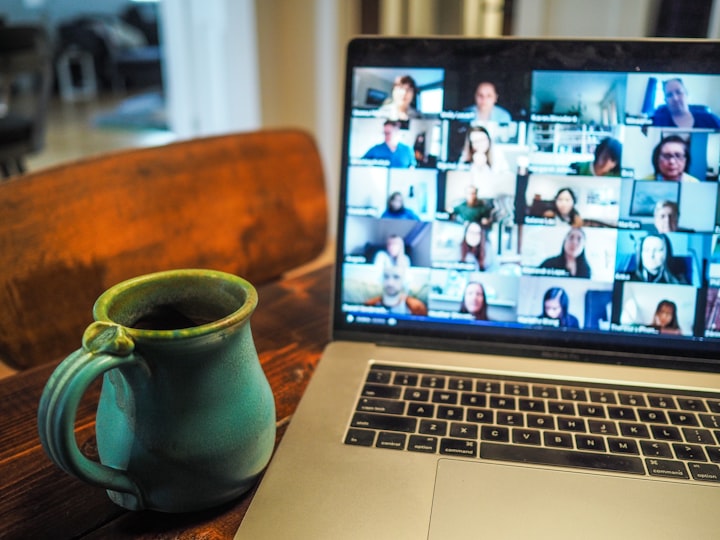
I was participating in a virtual happy hour with some friends when I felt an anxiety attack sneak up on me.
One minute I was nodding along and smiling at something a friend was saying, the next minute I felt a heavy weight on my chest. My heart was racing. My breathing became labored and shallow. Sweat dripped down my back. I felt lightheaded and shaky.
I made an excuse and dropped off the call. I forced myself to sit still and take slow breaths, making the exhale longer than my inhale. I pressed my feet into the floor to feel grounded. After what felt like a lifetime but was likely only a few minutes, I felt my body gradually relaxing.
When it was all over I wondered why something we are desperately longing for during this pandemic — the human connection — was making me feel crazy.
We all feel anxious sometimes. We might feel anxious before a presentation, or when someone we love is sick, when we are short on money, or as part of a break-up. But for some of us, anxiety is a constant companion, always waiting in the wings to jump out at us without warning.
Generalized Anxiety Disorder (GAD) can be caused by brain chemistry, trauma, or genetics. Everyone is different, but in general people with GAD experience symptoms like:
· A persistent sense of dread
· Overthinking and planning for worst-case scenarios
· Difficulty concentration
· Inability to relax or let things go
· Indecisiveness
· Difficulty handling uncertainty
Anxiety can manifest itself in several ways including: insomnia, perfectionism, social isolation, rigid punctuality, seeking approval, lack of confidence, and physical symptoms like stomach issues and headaches.
If you don’t have an anxiety disorder, it can be difficult to understand.
“What are you anxious about?” people sometimes ask me. That’s the difference between them and me: their anxiety is tied to a certain event, mine is just there. All the time.
There is a scene in the movie When Harry Met Sally that perfectly illustrates the difference between someone with GAD and other people:
Harry: Do you ever think of death?
Sally: Yes
Harry: Sure you do. A fleeting thought that drifts in and out of the transom of your mind. I spend hours, I spend days….
Sally: And you think this makes you a better person?
Harry: Look, when the shit comes down, I’m gonna be prepared and you’re not, that’s all I’m saying.
Sally: And in the meantime, you’re gonna ruin your whole life waiting for it
Most of the time my anxiety disorder manifests itself as a pervasive sense of dread. I will wake up with a bad feeling that something terrible is going to happen. “This is just your anxiety,” I tell myself. “Or maybe it’s a premonition,” my anxiety responds. I will text the people I care about, ostensibly just to say hi, but really I am assuring myself that they are alive and well.
“When you’re driving do you ever wonder what would happen if you accidentally drove off a cliff?” I asked my brother recently.
“All the time,” he responded immediately. Anxiety disorder runs in the family.
Besides the pervasive sense of dread and thinking of worst-case scenarios, I spent a lot of time planning and replaying conversations in my head. I feel like I’m going to break out in hives if I am late for something. And I alternate between obsessing and not being able to focus. This manifests itself as me getting totally obsessed with something, then forgetting all about it and moving onto a new obsession.
The worst is when I experience full-on anxiety attacks. Lately, that’s been happening more and more, and I’ve realized that this is directly related to the pandemic. I’m not anxious about dying of COVID-19 or being stuck in the house, I’m anxious about spending every hour of every workday on video calls.
Video calls are triggering my anxiety in ways I never would have expected. I’m not alone in this. Psychologists have a newly coined term for this: Zoom Anxiety.
When you are in a live meeting you usually focus on one person, the person who is talking. On a video call, you’re watching multiple people on the screen at the same time.
When I’m on a video call our attention whips back and forth from person to person, watching them. It becomes impossible to fully concentrate when I am trying to see people’s reactions, trying to figure out what books are on the shelf behind them, noticing what their cat is doing.
It’s too much stimulation, and that makes me anxious.
In real life, you can tune into body language and pauses that give you space to talk. You get immediate real-time visual feedback on the conversation.
With the slight delays in the video platforms, we are constantly interrupting or talking over each other. Someone’s internet freezes. There is always that one person that forgets to mute or unmute, breaking the flow of conversation.
When I see someone make a face or cross their arms, I don’t know if they are reacting to me or to something happening off-screen. It all makes me feel off-kilter.
Seeing myself on the screen also makes me anxious.
Other than the occasional glances in the mirror for grooming, I don’t look at myself too often, which helps me not feel bad about my appearance.
Now I’m staring at myself on the screen all the time, I notice the bags under my eyes, my double chin, and the way I look up toward my brain when I’m talking, as if asking my brain to help me. I notice that no matter where or how I sit, my shirt always seems to be bunched up weirdly around my chest.
I haven’t felt this bad about my appearance since I was a teenager.
The worse part of video calls is the way it creates such a feeling of isolation. Even something meant to keep a connection, like a virtual happy hour, reminds me that I am separate, triggering anxious thoughts and groundless fears.
Video calls are more likely to trigger my anxiety when they go on for longer than an hour, when there are more than two or three other participants, and based on the number of calls I have already participated in that day.
I’m looking forward to the time we can go back to the office and interact live.
In the meantime, I recognize that they are a necessary evil and try to give myself some grace when I start to freak out. I continue to take deep breaths, do grounding exercises, get off the call when I can’t take it anymore, and remind myself that anxiety is a liar.
fAn earlier version of this article appeared elsewhere.
About the Creator
Rose Bak
Rose Bak is a writer, author & yoga teacher who writes on a diverse range of topics. She is also a published author of romantic fiction. Visit Rose's website at rosebakenterprises.com or follow her on social media @AuthorRoseBak.






Comments
There are no comments for this story
Be the first to respond and start the conversation.